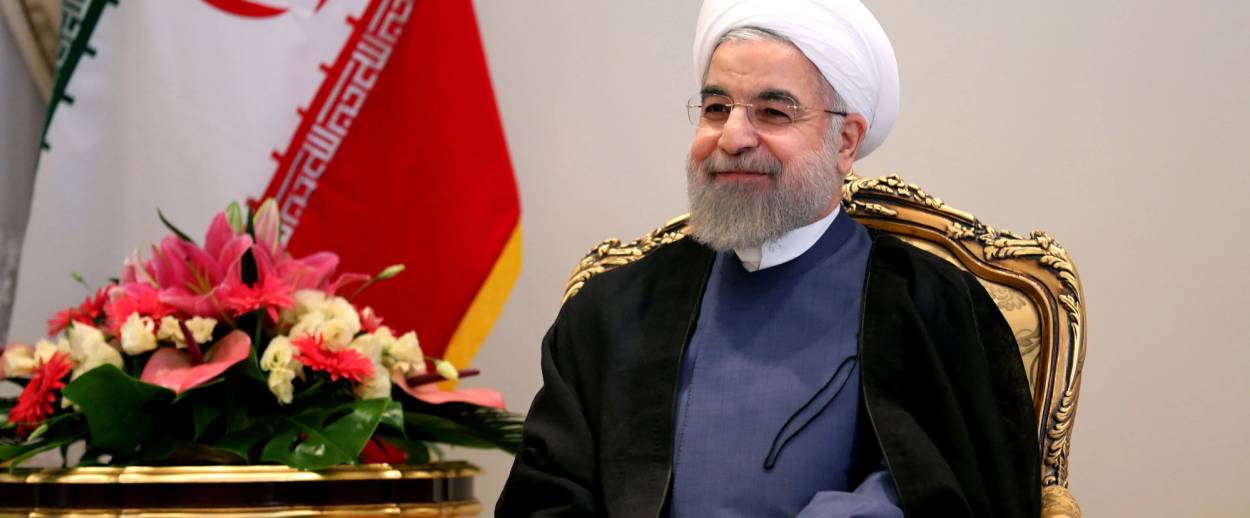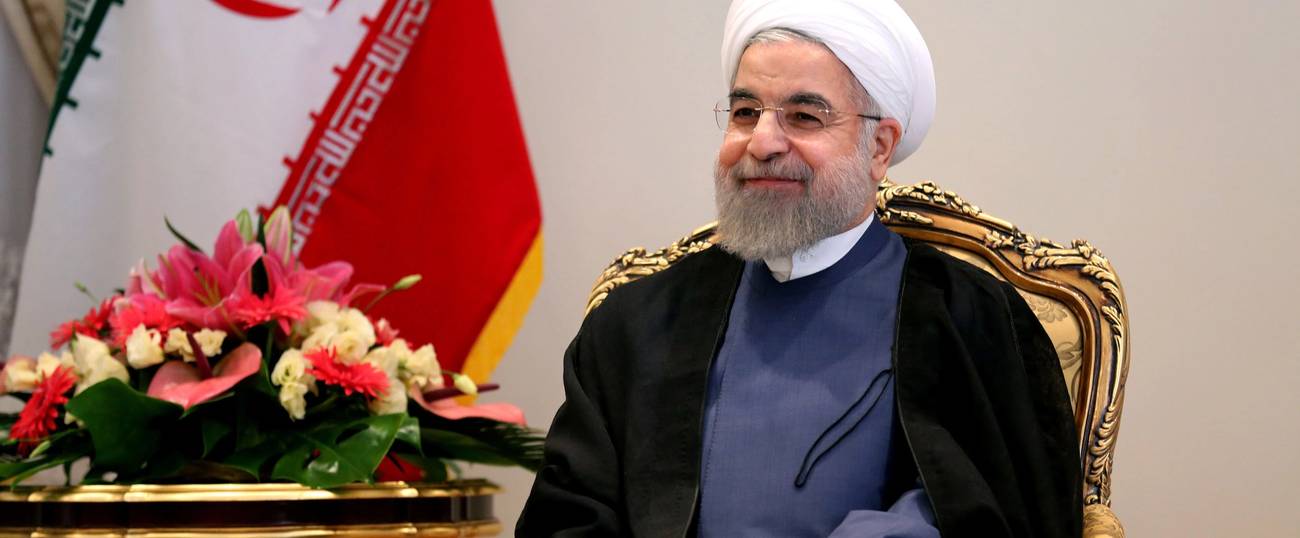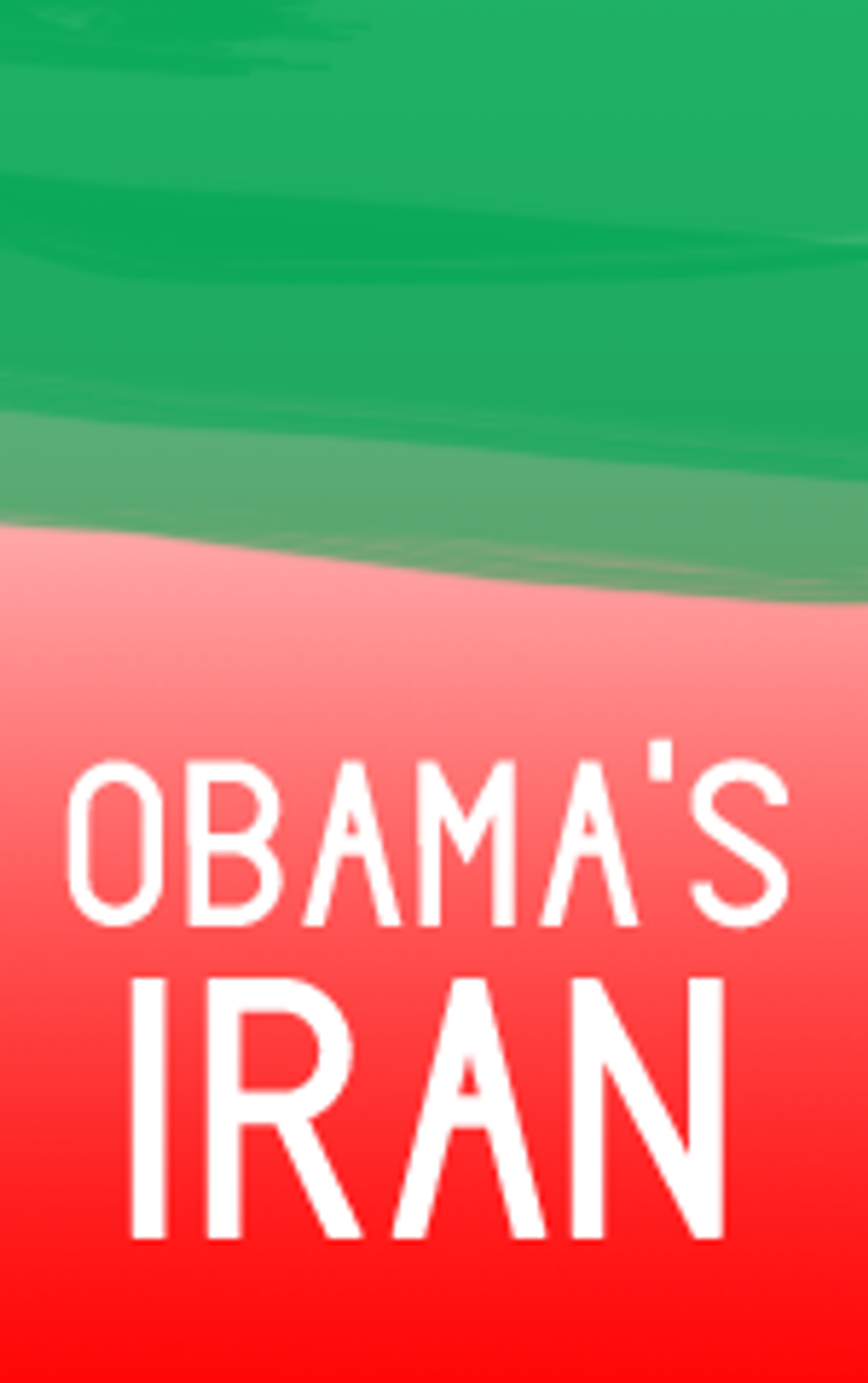The Most Famous Casualty of Obama’s Nuclear Deal Could Ultimately Be Hassan Rouhani
Why the Iranian president faces a severe test from powerful hardline conservatives inside the Islamic Republic—and why the moderates may lose




Current wisdom is that the nuclear deal will strengthen moderates within Iran, who will be seen as having delivered on their promise to strike a deal with the United States and deliver the country from crippling sanctions. However, the exact opposite may be even more likely to occur. Iran’s leadership may well pocket the deal and punish president Hassan Rouhani and his moderate allies for the concessions they made in Vienna. This is despite the fact that Iran’s Foreign Minister Javad Zarif made every decision and compromise at the nuclear talks with the explicit approval of the supreme leader or of his appointed representatives. He would not dare do otherwise.
So, why should the Rouhani administration be blamed for the compromises when in fact it was the supreme leader who approved every single one of them? The simple answer in this case is: Why should the supreme leader admit to any compromise, when he can let Zarif’s boss President Hassan Rouhani and his government take the fall? That’s one of the downfalls of working as president for the supreme leader in post revolution Iran: You get all the responsibility, but much less in terms of authority. Or as Iran’s first Prime Minister Mehdi Bazargan described after his resignation in November 1979, it’s like “giving a knife to someone, but the blade of the knife to someone else. He [the government] is holding a knife without a blade.” In other words, the real power is in someone’s else hand, in Bazargan’s case, Ayatollah Khomeini.
The same applies to being president in Iran these days (the post of prime minister was dissolved in a 1989 referendum). Although it may appear that Rouhani made compromises to the United States in the talks, as a matter of fact it was someone else far more powerful than him whose permission he needed to do this: the supreme leader. But because the president is the public face of the negotiations, he gets the blame for the compromises, while the supreme leader enjoys plausible deniability.
Many people in Iran know this. But then there is the other reality: Who would dare criticize the supreme leader in Iran for approving the compromises? Public criticism of Iran’s most powerful man is a red line that very few have dared cross. The president and other government officials, on the other hand, are subject to regular public criticism in the press and in the parliament.
What should worry Rouhani is that his hardline critics have plenty of ammunition to attack him with, as the deal contains numerous compromises. Some are far more serious than others. For example: Compromises made in Vienna have crossed three very public red lines set by the supreme leader on June 23 this year.
The first red line is regarding time limitations. During his June 23 speech Khamenei condemned limitation time lines of 10 and 12 years demanded from Iran in the agreement. “Ten years is a lifetime,” stated the supreme leader in his speech, which his official website titled “the most important red lines of the nuclear negotiations.” Later on in the same speech, Khamenei also said that timelines of 15 years and 25 years are unacceptable as well. When looking at the deal, we see that the red lines set by Khamenei on the limitation time lines have been crossed. For example Iran is obliged to curb its Uranium enrichment at 3.67 percent for 15 years. It has also promised not to build any new heavy water plants for 15 years. Meanwhile “the IAEA’s surveillance of Iranian mines, the source for ore processed into nuclear fuel, will continue for 25 years, and centrifuge workshops will be monitored for 20 years.”
The second stated red line that has been crossed regards the inspection of military sites, which Khamenei ruled out in the same speech. From the deal we can see that inspections of military sites by the IAEA are included in the deal.
The third crossed red line has to do with the issue of sanctions. On June 23, Ayatollah Khamenei explicitly ruled out the removal of sanctions being conditional upon Iran first having to reduce its number of centrifuges and wrecking the core of the Arak reactor and sanctions being removed once the IAEA has confirmed that Iran has lived up to its commitments. He instead called for a more reciprocal quid pro quo between two sides of corresponding steps that take place simultaneously. However, a closer look at the deal shows that despite his red line, Iran has to reduce its number of centrifuges and fill in the core of the Arak reactor with bricks first, and once the IAEA has verified that Iran has taken the necessary steps, “U.N. sanctions terminate, E.U. sanctions terminate (in some cases only suspended), U.S. ‘ceases’ application of nuclear related sanctions.”
Rouhani’s hardline rivals will also not be short of motivation to increase their attacks against his administration in the post-deal period. According to the ultra conservative Farhang News, the hardliners are concerned that now that the deal has been concluded Rouhani could start settling scores with his rivals. So, instead of waiting for Rouhani to come after them, they seem to be applying an offensive strategy whereby they have increased their attacks against the deal in their publications such as the hardline Keyhan newspaper and sites such as Raja News. The intensity of their attacks is likely to pick up significantly over the coming weeks and months.
***
Hardliners also seem to be worried that now that Iranian people have seen that reform is possible in foreign policy, they may want the same for domestic policy. In a special report, the hardline conservative news site 598.ir noted how small of groups of people celebrating the nuclear agreement in Tehran’s Vanak Square were also chanting in support of Iranian opposition leader Mir Hossein Mousavi, who is under house arrest. Furthermore, some of the young people celebrating were also wearing green wristbands in support of the Green movement. These are likely to ring serious alarm bells among the hardliners and to make them more adamant in wanting to make sure that Rouhani’s power is reduced, and fast.

It also seems that Rouhani’s apparent success in the talks is attracting more members of the Iranian parliament toward his position. In an article for the moderate Aftab-e Yazd publication published on July 22, Maryam Alizadeh Mansouri uses the popular term “supporters of the party of wind” (Hezb-e baadi ha) to describe such opportunists, who frequently change positions in line with what is popular. Such a term is also used for soccer fans in Iran who frequently change loyalties to different teams, depending on who is doing well. Sensing that Rouhani’s position is popular with the people of Iran and with the Iranian parliamentary elections scheduled for Feb. 25, 2016, more of such opportunists are reportedly backing the position of Rouhani in the parliament. This is also likely to make the hardliners very concerned.
So, how are Rouhani’s rivals likely to undermine his government? First through direct and fierce criticism of the concessions made in their affiliated press and speeches, which is already happening and could get worse very soon. This is likely to be in addition to intense behind-the-scenes lobbying to ensure that the Guardian Council disqualifies pro-Rouhani candidates for the upcoming parliamentary and Assembly of Experts elections, both scheduled for February 2016.
The most important question that Rouhani and his supporters would want answered is: Now that the negotiations are over, once the U.N., U.S., and E.U. sanctions are removed, will the supreme leader defend the Rouhani government against its critics like he did prior to the deal?
During post-Sept. 11 debates in Iran over the pros and cons of cooperating with the Bush Administration against the Taliban, Rouhani, who was then the supreme leader’s representative to the Supreme National Security, expressed his reservations. Using a popular Persian expression he stated that “as soon as their donkey passed the bridge [meaning, as soon as they got want they wanted] they will go back to their previous hostile position.” Many in Iran believe Rouhani was right. Soon after using Iran’s assistance to invade the Taliban-ruled Afghanistan, after getting what he wanted from Iran, Bush slapped Iran in the face with his “Axis of Evil” speech.
The same expression could now be used to express the way the supreme leader could see Rouhani after the U.N., U.S., and E.U. sanctions are lifted. Once his donkey has crossed the bridge, it’s quite possible that he will not protect Rouhani against the hardline conservatives in the same manner he did prior to and during the negotiations. This is a realistic scenario as the supreme leader has always been closer to the conservative wing of Iranian politics than the moderates. Also, continuous, long term defense of the Rouhani government could associate the supreme leader with a deal that increasing number of hard liners are condemning and are likely to condemn for many years to come.
The scenario of a weaker Rouhani after a nuclear deal cannot and should not be dismissed, especially by those who are hoping to see a transformation in U.S.–Iran relations, and an improvement in the position of Iranian moderates inside Iranian politics brought about by the Vienna nuclear agreement.
***
Like this article? Sign up for our Daily Digest to get Tablet Magazine’s new content in your inbox each morning.
Meir Javedanfar teaches Iranian politics and security studies at the Interdisciplinary Center (IDC) in Herzliya, Israel. He can be found on Twitter @Meirja.